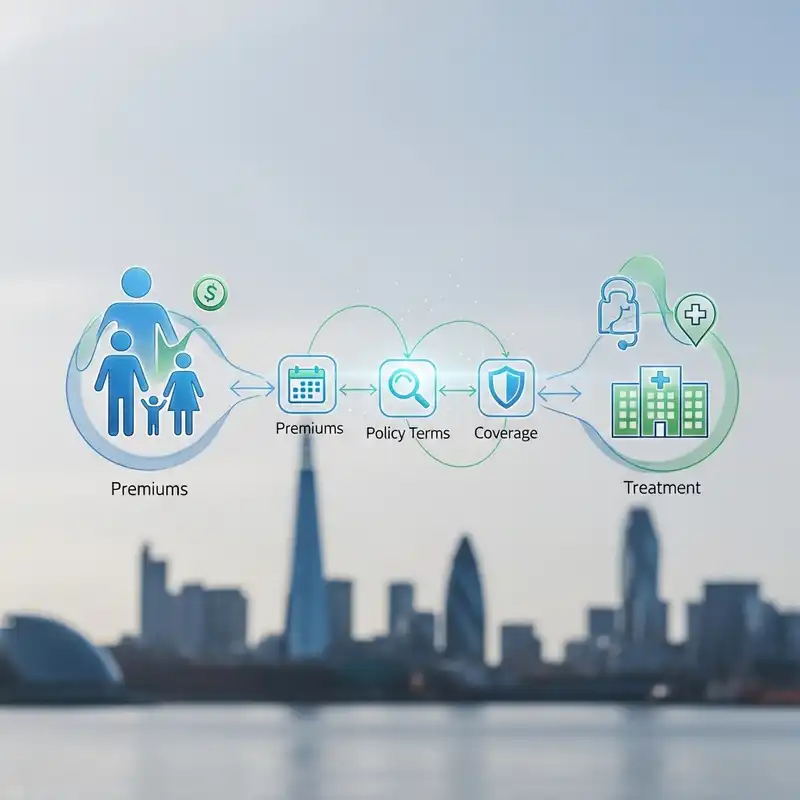Cataract Surgery in the UK

WeCovr explains cataract surgery, waiting times, and how PMI offers faster treatment
As an FCA-authorised expert that has helped arrange over 900,000 policies, WeCovr understands that navigating healthcare options in the UK can be daunting. This is especially true for common conditions like cataracts, where excellent NHS treatment exists but can involve lengthy waits. Our guide explains everything you need to know about cataract surgery, the current waiting times, and how private medical insurance can provide a faster route to clearer vision.
Understanding Cataracts: What Are They and Who Gets Them?
A cataract is a common eye condition where the natural lens inside your eye becomes cloudy. Your lens, which sits just behind your pupil, works much like a camera lens, focusing light onto the retina at the back of your eye. When you're young, this lens is perfectly clear. As we age, proteins in the lens can clump together, creating a cloudy or opaque area—a cataract.
Imagine looking at the world through a foggy window or a piece of frosted glass. That’s what vision with a cataract can be like. It usually develops slowly over many years and can affect one or both eyes.
Common Symptoms of Cataracts
The signs of a cataract can be subtle at first but tend to worsen over time. Look out for:
- Blurred or Misty Vision: Your sight may seem cloudy, making it hard to see fine details.
- Faded Colours: Colours may appear washed out or have a yellowish or brownish tint.
- Glare and Halos: You might find bright lights, like car headlights or sunshine, dazzling. You may also see halos around lights, especially at night.
- Poor Night Vision: Driving or navigating in low light becomes increasingly difficult.
- Double Vision: You might see a double image in one eye.
- Frequent Prescription Changes: You may find your glasses or contact lens prescription needs updating more often.
Who is at Risk?
Ageing is the number one cause of cataracts. According to the Royal National Institute of Blind People (RNIB), around a third of people aged 65 and over in the UK have some degree of cataract development in one or both eyes. However, other factors can increase your risk:
- Family History: A genetic predisposition can play a role.
- Health Conditions: Diabetes is a significant risk factor.
- Lifestyle Choices: Smoking and excessive alcohol consumption can accelerate cataract formation.
- Sun Exposure: Long-term exposure to ultraviolet (UV) light without proper eye protection.
- Previous Eye Injury or Surgery: Trauma to the eye can lead to cataracts.
- Long-term use of steroid medication.
A Step-by-Step Guide to Modern Cataract Surgery
The good news is that cataracts are entirely treatable. The only effective treatment is surgery to remove the cloudy lens and replace it with a clear, artificial one. This procedure, known as phacoemulsification, is the most common operation performed in the UK, with an extremely high success rate.
It's a day-case procedure, meaning you won't need to stay in the hospital overnight. The surgery itself is remarkably quick, typically taking just 15 to 20 minutes per eye.
Here’s what happens on the day:
- Preparation: You'll be given local anaesthetic eye drops to completely numb your eye. You will be awake during the procedure, but you won't feel any pain. You may also be offered a mild sedative to help you relax.
- The Incision: The surgeon makes a tiny, self-healing incision (around 2-3mm) in your cornea (the front surface of your eye).
- Removing the Cataract: A small ultrasound probe is inserted through the incision. This probe emits high-frequency sound waves that break the cloudy lens into tiny fragments. This part of the process is called phacoemulsification. The fragments are then gently suctioned out.
- Inserting the New Lens: A clear, foldable artificial lens, called an Intraocular Lens (IOL), is inserted through the same tiny incision. Once inside, it unfolds into position, permanently replacing your natural lens.
- Recovery: The tiny incision is self-sealing and rarely requires stitches. A protective shield will be placed over your eye, and after a short rest, you'll be ready to go home.
Choosing Your New Lens (IOL)
A key part of the process is selecting the right IOL. This is an area where private treatment can offer more options than the NHS.
| Lens Type | Description | Best For | Potential Drawback |
|---|---|---|---|
| Monofocal (Standard) | The most common type, especially on the NHS. Corrects vision for one fixed distance, usually long distance. | Providing clear distance vision. Ideal for driving or watching TV. | You will almost certainly need reading glasses for close-up tasks like reading a book or using a phone. |
| Multifocal | Designed to provide clear vision at multiple distances (near, intermediate, and far). | Reducing or eliminating the need for glasses altogether. | Can sometimes cause glare or halos around lights, especially at night. Can be more expensive. |
| Toric | Specifically designed to correct astigmatism, a common condition where the cornea is shaped more like a rugby ball than a football. | People with significant astigmatism, providing sharper vision without glasses. | Corrects astigmatism but may still be monofocal, requiring reading glasses. |
| Extended Depth of Focus (EDOF) | A newer type of lens that creates a single, elongated focal point to enhance the range of vision. | Providing good distance and intermediate (e.g., computer) vision with fewer visual side effects than multifocal lenses. | May still require weak reading glasses for very fine print. |
On the NHS, you will typically be offered a standard monofocal lens. If you opt for private treatment, either through self-funding or private medical insurance, you often have access to a wider range of premium lenses, which could significantly reduce your dependence on glasses after surgery.
Navigating NHS Cataract Treatment: The Reality of Waiting Times
The standard of cataract surgery on the NHS is excellent. The surgeons are highly skilled, and the outcomes are overwhelmingly positive. The primary challenge, however, is access. Due to immense pressure on services, waiting times for treatment can be substantial.
The journey on the NHS typically follows these steps:
- Visit an Optician: If you have symptoms, your first stop is usually an optician for an eye test. They can detect cataracts.
- GP Referral: If a cataract is affecting your quality of life, your optician will write to your GP, who will then refer you to an NHS hospital's ophthalmology department.
- Hospital Assessment: You'll be placed on a waiting list for an initial assessment with a hospital specialist (ophthalmologist).
- Joining the Surgical List: If the specialist agrees that your cataracts meet the local commissioning group's criteria for surgery (your vision must usually be impaired to a certain level), you will be placed on the waiting list for the operation itself.
UK-Wide Waiting Times in 2025
The official NHS target in England is for 92% of patients to begin treatment within 18 weeks of their referral. Unfortunately, for ophthalmology—the specialty that covers cataracts—this target is consistently missed.
As of early 2025, the picture across the UK remains challenging:
- Median Wait: The median waiting time from referral to treatment in ophthalmology across England is hovering around 20-25 weeks, but this is just the average.
- Long Waits: A significant number of patients wait much longer. It is not uncommon for the entire process, from GP referral to surgery, to take 9 to 12 months, and in some areas, even longer.
- Regional Variation: Waiting times vary dramatically depending on your local NHS Trust. Some areas have much longer backlogs than others.
The Impact of Waiting
A year-long wait might not sound terrible, but for someone whose vision is deteriorating, it can have a profound impact on their quality of life:
- Loss of Independence: Difficulty with driving can mean losing the freedom to visit friends, go shopping, or attend appointments.
- Struggles with Daily Tasks: Reading, cooking, and enjoying hobbies can become frustrating or impossible.
- Increased Risk of Falls: Poor vision is a major contributor to falls in older people, which can lead to serious injury.
- Social Isolation: If you can no longer participate in activities you enjoy, it can lead to loneliness and a decline in mental wellbeing.
This is where exploring alternatives becomes essential for many.
How Private Medical Insurance (PMI) Offers a Faster Path to Clearer Vision
Private medical insurance UK provides a powerful alternative to long NHS queues. It's a policy you pay for—either monthly or annually—that covers the cost of private treatment for eligible, acute conditions like cataracts.
The key benefit is speed. With PMI, the journey to clearer vision is significantly shorter:
- Get a Referral: Your GP can provide an open referral, which allows you to choose your specialist.
- Choose Your Specialist and Hospital: You can select a leading ophthalmologist and a comfortable, local private hospital from your insurer's approved network.
- Fast Consultation: You'll typically see the specialist within days or a couple of weeks.
- Swift Surgery: Once you and your consultant agree to proceed, the surgery can be scheduled in a matter of weeks, at a time that is convenient for you.
The entire process, from referral to surgery, can often be completed in 4 to 8 weeks.
A Critical Point: Pre-existing Conditions
This is the most important rule to understand about PMI. Standard UK private health cover is designed for acute conditions that arise after you take out your policy.
If you have already been diagnosed with cataracts, or are experiencing clear symptoms before your policy starts, the condition will be classed as "pre-existing" and will not be covered.
The purpose of insurance is to protect against future, unforeseen events. This is why it's so important to consider putting a policy in place when you are healthy, as a proactive measure for your future wellbeing. A specialist PMI broker like WeCovr can help you understand these rules and find a policy that's right for you long before you need it.
NHS vs. Private Cataract Surgery: A Head-to-Head Comparison
To help you decide what's best for you, here’s a clear comparison between the two pathways.
| Feature | NHS Treatment | Private Treatment (with PMI) |
|---|---|---|
| Waiting Time | Can be 9-12 months or longer from referral to surgery. | Typically 4-8 weeks from referral to surgery. |
| Cost | Free at the point of use. | You pay your monthly insurance premiums and a pre-agreed excess on your claim. |
| Choice of Surgeon | You will be treated by a qualified surgeon, but you have no choice over who it is. | You can choose your consultant from a list of approved specialists. |
| Choice of Hospital | You will be treated at your local NHS hospital or a designated treatment centre. | You can choose from a nationwide network of high-quality private hospitals. |
| Choice of Lens (IOL) | A standard, high-quality monofocal lens is typically used. | You often have access to premium lenses (multifocal, toric, EDOF) which can reduce your need for glasses. |
| Environment | Treatment is in a busy NHS hospital environment, often on a ward with other patients. | Treatment is in a comfortable private hospital, usually with your own private room for recovery. |
| Post-operative Care | Follow-up appointments are standard but can be in busy clinics. | Follow-up care is often more personalised, with direct access to your consultant's team. |
Understanding the Costs: Self-Funding vs. Using Private Health Cover
If you decide to go private, there are two ways to pay for it.
1. Self-Funding
This means paying for the entire cost of the operation yourself. The price can vary depending on the hospital, the surgeon's fees, and the type of lens you choose.
In 2025, the average cost for private cataract surgery in the UK is between £2,500 and £4,500 per eye.
Choosing a premium multifocal or toric lens will place the cost at the higher end of this scale. While this guarantees fast treatment, it is a significant out-of-pocket expense, especially if you need surgery on both eyes.
2. Using Private Health Cover
This is often a more manageable and predictable way to fund private treatment. Instead of a large one-off payment, you pay regular monthly premiums for your insurance policy. When you need treatment for an eligible condition like cataracts, the insurer covers the cost, and you simply pay a contribution known as the 'excess'.
- Premiums: The monthly cost of a PMI policy depends on your age, health, lifestyle, and the level of cover you choose.
- Excess: This is a fixed amount you agree to pay towards any claim. It can range from £0 to £1,000. Choosing a higher excess is a common way to reduce your monthly premiums.
By having private health insurance in place, you are protected against unexpected medical bills, giving you peace of mind and control over your healthcare.
Finding the Best PMI Provider for Your Needs
The UK market has several excellent insurers, but their policies can differ significantly. When searching for the best PMI provider, it's crucial to look beyond just the price.
Key factors to consider include:
- Level of Cover: Policies are often tiered (e.g., budget, mid-range, comprehensive). A key feature to check is the 'outpatient limit'. You will need outpatient cover for your initial consultation and diagnostic tests, so ensure the limit is sufficient.
- Hospital List: Insurers have different lists of approved hospitals. Check that the list includes convenient, high-quality private facilities near you.
- The 'No Claims Discount': Similar to car insurance, many PMI policies reward you with a discount on your premium for every year you don't make a claim.
- Underwriting Type: You'll choose between 'Moratorium' (simpler to set up, but with a rolling two-year exclusion period for pre-existing conditions) and 'Full Medical Underwriting' (requires a health questionnaire upfront but provides absolute clarity on what is and isn't covered from day one).
Working with an independent broker like WeCovr is invaluable here. We are not tied to any single insurer. Our experts compare policies from across the market, including major names like Aviva, AXA Health, Bupa, and Vitality, to find the one that best matches your needs and budget—all at no cost to you.
Beyond Surgery: Tips for Maintaining Good Eye Health
While you can't always prevent cataracts, a healthy lifestyle can certainly help to delay their onset and support your overall eye health.
- Eat an Eye-Healthy Diet: Focus on foods rich in antioxidants like vitamins C and E, lutein, and zeaxanthin. Excellent choices include leafy greens (spinach, kale), citrus fruits, berries, nuts, seeds, and colourful vegetables like bell peppers and carrots.
- Protect Your Eyes from the Sun: Always wear sunglasses that block 100% of UVA and UVB rays when you are outdoors. A wide-brimmed hat provides extra protection.
- Quit Smoking: Smoking produces free radicals that can damage the cells in your eyes, significantly increasing your risk of cataracts and other eye diseases like macular degeneration.
- Manage Other Health Conditions: If you have diabetes, keeping your blood sugar levels well-controlled is one of the most important things you can do for your eye health.
- Get Regular Eye Tests: An optician can spot the early signs of cataracts and other conditions long before you notice symptoms. A check-up every two years is recommended, or more frequently if advised.
At WeCovr, we believe in proactive health. That's why customers who purchase PMI or Life Insurance through us receive complimentary access to CalorieHero, our AI-powered calorie and nutrition tracking app. It's a fantastic tool to help you make healthier food choices that benefit your whole body, including your eyes. Furthermore, our clients often enjoy discounts on other types of insurance cover, providing even greater value.
Can I get private medical insurance if I already have cataracts?
How much does private cataract surgery cost in the UK?
Does private health insurance cover premium multifocal lenses?
How quickly can I get cataract surgery with private medical insurance?
Ready to take control of your future health and ensure fast access to treatments like cataract surgery? WeCovr’s friendly, FCA-authorised experts are here to help. We compare the UK’s leading insurers to find you the best private medical insurance at a competitive price. Our high customer satisfaction ratings reflect our commitment to clear, impartial advice.
Contact WeCovr today for your free, no-obligation quote and secure your peace of mind.
Related guides
Why private medical insurance and how does it work?
What is Private Medical Insurance?
Private medical insurance (PMI) is a type of health insurance that provides access to private healthcare services in the UK. It covers the cost of private medical treatment, allowing you to bypass NHS waiting lists and receive faster, more convenient care.How does it work?
Private medical insurance works by paying for your private healthcare costs. When you need treatment, you can choose to go private and your insurance will cover the costs, subject to your policy terms and conditions. This can include:• Private consultations with specialists
• Private hospital treatment and surgery
• Diagnostic tests and scans
• Physiotherapy and rehabilitation
• Mental health treatment
Your premium depends on factors like your age, health, occupation, and the level of cover you choose. Most policies offer different levels of cover, from basic to comprehensive, allowing you to tailor the policy to your needs and budget.
Questions to ask yourself regarding private medical insurance
Just ask yourself:👉 Are you concerned about NHS waiting times for treatment?
👉 Would you prefer to choose your own consultant and hospital?
👉 Do you want faster access to diagnostic tests and scans?
👉 Would you like private hospital accommodation and better food?
👉 Do you want to avoid the stress of NHS waiting lists?
Many people don't realise that private medical insurance is more affordable than they think, especially when you consider the value of faster treatment and better facilities. A great insurance policy can provide peace of mind and ensure you receive the care you need when you need it.
Benefits offered by private medical insurance
Private medical insurance provides numerous benefits that can significantly improve your healthcare experience and outcomes:Faster Access to Treatment
One of the biggest advantages is avoiding NHS waiting lists. While the NHS provides excellent care, waiting times can be lengthy. With private medical insurance, you can often receive treatment within days or weeks rather than months.
Choice of Consultant and Hospital
You can choose your preferred consultant and hospital, giving you more control over your healthcare journey. This is particularly important for complex treatments where you want a specific specialist.
Better Facilities and Accommodation
Private hospitals typically offer superior facilities, including private rooms, better food, and more comfortable surroundings. This can make your recovery more pleasant and potentially faster.
Advanced Treatments
Private medical insurance often covers treatments and medications not available on the NHS, giving you access to the latest medical advances and technologies.
Mental Health Support
Many policies include comprehensive mental health coverage, providing faster access to therapy and psychiatric care when needed.
Tax Benefits for Business Owners
If you're self-employed or a business owner, private medical insurance premiums can be tax-deductible, making it a cost-effective way to protect your health and your business.
Peace of Mind
Knowing you have access to private healthcare when you need it provides invaluable peace of mind, especially for those with ongoing health conditions or concerns about NHS capacity.
Private medical insurance is particularly valuable for those who want to take control of their healthcare journey and ensure they receive the best possible treatment when they need it most.
Important Fact!
We can look at a more suitable option mid-term!
Why is it important to get private medical insurance early?
👉 Many people are very thankful that they had their private medical insurance cover in place before running into some serious health issues. Private medical insurance is as important as life insurance for protecting your family's finances.👉 We insure our cars, houses, and even our phones! Yet our health is the most precious thing we have.
Easily one of the most important insurance purchases an individual or family can make in their lifetime, the decision to buy private medical insurance can be made much simpler with the help of FCA-authorised advisers. They are the specialists who do the searching and analysis helping people choose between various types of private medical insurance policies available in the market, including different levels of cover and policy types most suitable to the client's individual circumstances.
It certainly won't do any harm if you speak with one of our experienced insurance experts who are passionate about advising people on financial matters related to private medical insurance and are keen to provide you with a free consultation.
You can discuss with them in detail what affordable private medical insurance plan for the necessary peace of mind they would recommend! WeCovr works with some of the best advisers in the market.
By tapping the button below, you can book a free call with them in less than 30 seconds right now:
Our Group Is Proud To Have Issued 900,000+ Policies!
We've established collaboration agreements with leading insurance groups to create tailored coverage
























How It Works
1. Complete a brief form

2. Our experts analyse your information and find you best quotes

3. Enjoy your protection!

Any questions?
Learn more

Who Are WeCovr?
WeCovr is an insurance specialist for people valuing their peace of mind and a great service.👍 WeCovr will help you get your private medical insurance, life insurance, critical illness insurance and others in no time thanks to our wonderful super-friendly experts ready to assist you every step of the way.
Just a quick and simple form and an easy conversation with one of our experts and your valuable insurance policy is in place for that needed peace of mind!





